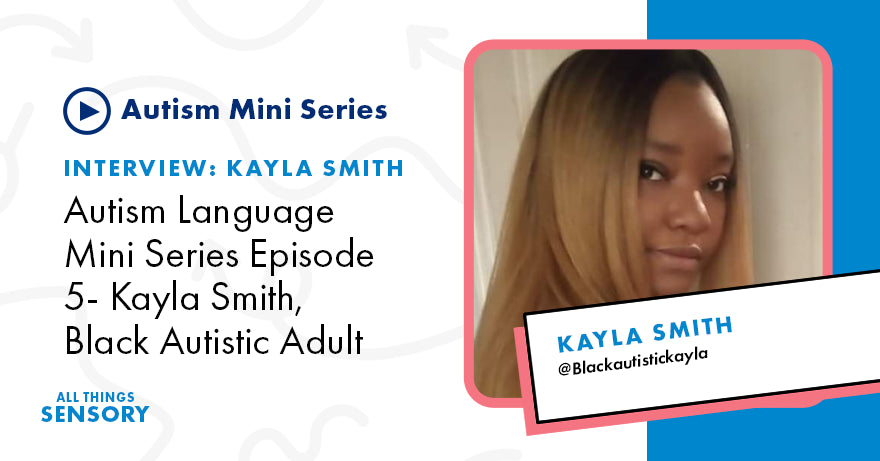Your Cart is Empty

April is Autism Acceptance Month. This month, we’re releasing one new episode each week, in addition to our regularly scheduled episodes. These episodes are all about the language surrounding Autism. We had the privilege of interviewing several people for this Mini Series and we’re excited for you to listen in!
Kayla Smith is a Disability Rights Advocate. She wants to educate people about autism and remove the stigma around it. She talks about intersectionality within autism. She wants to ensure black autistic people are represented. She is a creator of #AutisticBlackPride, which is about celebrating being black and autistic.
Kayla’s Instagram @blackautistickayla
All of Kayla’s links
We’d love to answer your questions on the podcast! Fill out this form -> https://harkla.typeform.com/to/ItWxQNP3
Looking for more in-depth help? Sign up for 2-on-1 Mentoring With Us!!
All Things Sensory Podcast Instagram
Harkla Website - Shop Sensory Products!
April is Autism Acceptance Month, a time to expand our understanding of autism and celebrate the diversity within the autistic community. While many discussions focus on broad awareness, few dive into the nuanced experiences of individuals, particularly those at the intersection of autism and other identities.
This article shares insights from Kayla Smith, a disability rights advocate and creator of "Autistic Black Pride," who illuminates the importance of intersectionality, language, and representation in autism advocacy.
Historically, "person-first" language like "person with autism" was encouraged to separate the individual from their condition. However, many within the autistic community, including Kayla, now prefer "identity-first" language such as "autistic person."
Why? As Kayla explained, "Autism shapes how I see the world. It’s not something separate from me—it’s a core part of who I am." Using identity-first language respects this perspective and fosters a sense of pride rather than stigma.
Takeaway: When discussing autism, consider asking individuals what language they prefer and respect their choice.
Intersectionality is a framework that examines how overlapping identities—like race, gender, and disability—shape an individual's experiences. For Kayla, understanding her identity as both Black and autistic was transformative.
"Media often portrays autism as a white male experience," she shared. This limited representation perpetuates disparities in diagnosis and support, particularly for Black and Brown individuals.
Kayla highlighted the importance of addressing these inequities, noting, "If I hadn’t been diagnosed at age two, I might have been one of the many Black autistic individuals diagnosed much later, or not at all."
Autism diagnosis disparities are influenced by race, gender, and socioeconomic status.
Greater representation in media and advocacy is crucial to ensure all voices are heard.
Intersectionality enriches the conversation around autism, offering diverse perspectives and solutions.
Kayla’s advocacy work began with organizing autism awareness events during her college years. Over time, her focus shifted from awareness to acceptance and inclusion.
She uses platforms like Twitter and Instagram to connect with others and educate her followers on topics like stigma, language, and intersectionality. "At first, I was just learning from others," she said.
"But as I grew, I realized the power of sharing my story to challenge biases and open minds." Her work through "Autistic Black Pride" celebrates the intersection of race and autism, promoting pride and solidarity among Black autistic individuals.
Kayla emphasized that advocacy is about more than awareness—it’s about changing the narrative. "We still see the same stories in the media," she explained, "often ignoring voices like mine."
To truly embrace Autism Acceptance Month, it’s important to:
Challenge Stereotypes: Move beyond traditional portrayals of autism in media.
Amplify Diverse Voices: Listen to and share stories from individuals across the autism spectrum, particularly those from marginalized communities.
Educate Yourself & Others: Use resources like Kayla’s work to learn about intersectionality and inclusivity.
As Kayla reminds us, "Autism affects every spectrum of life." By embracing diverse perspectives and fostering inclusive conversations, we can create a more accurate, empathetic, and supportive understanding of autism.
BORING, BUT NECESSARY LEGAL DISCLAIMERS
While we make every effort to share correct information, we are still learning. We will double check all of our facts but realize that medicine is a constantly changing science and art. One doctor / therapist may have a different way of doing things from another. We are simply presenting our views and opinions on how to address common sensory challenges, health related difficulties and what we have found to be beneficial that will be as evidenced based as possible. By listening to this podcast, you agree not to use this podcast as medical advice to treat any medical condition in either yourself or your children. Consult your child’s pediatrician/ therapist for any medical issues that he or she may be having. This entire disclaimer also applies to any guests or contributors to the podcast. Under no circumstances shall Rachel Harrington, Harkla, Jessica Hill, or any guests or contributors to the podcast, as well as any employees, associates, or affiliates of Harkla, be responsible for damages arising from use of the podcast.
Keep in mind that we may receive commissions when you click our links and make purchases. However, this does not impact our reviews and comparisons. We try our best to keep things fair and balanced, in order to help you make the best choice for you.
This podcast should not be used in any legal capacity whatsoever, including but not limited to establishing “standard of care” in a legal sense or as a basis for expert witness testimony. No guarantee is given regarding the accuracy of any statements or opinions made on the podcast.
Comments will be approved before showing up.